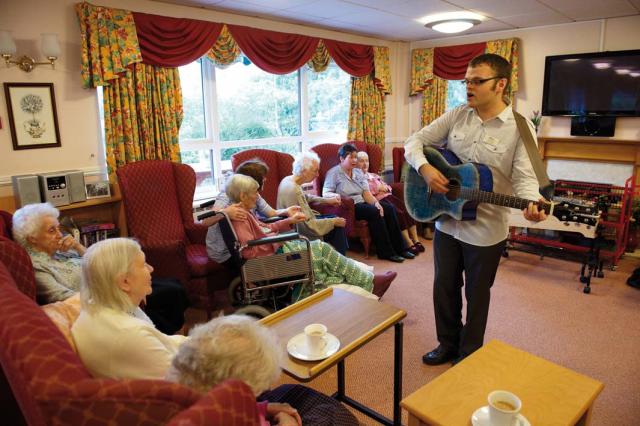- A
- A
- A
MHA joins debate for wider access to music therapy for people with dementia

Chris Wilson takes a group music therapy session
Wednesday 24 June 2015
Representatives from MHA will be joining leading academics, researchers and practitioners from the field of dementia meeting with MPs to debate how access to music therapy can be improved for people with dementia.
Leading research has shown that music therapy can significantly improve and support the mood, alertness and engagement of people with dementia, can reduce the use of medication, as well as helping to manage and reduce agitation, isolation, depression and anxiety, overall supporting a better quality of life (Ridder et al, 2013).
Music therapy can help people at all stages in their journey with dementia to enrich life and tap into the resources that people with dementia still have.
MHA provides music therapy in its care homes for people living with dementia and has been a pioneer of providing music therapy. It currently provides around 4,500 sessions a year with the aim of increasing this over the next few years. Head of Policy and Research Liz Jones and music therapist Chris Wilson will be taking part in the round table discussion.
Liz said: “I am delighted to bring the voice of MHA to this discussion, as one of the innovative providers of music therapy in dementia care and as one of the largest employer of music therapists in the country.
“We know from our research and daily practice the importance of music therapy in helping people with dementia and the need to make this available to many more older people.”
Debbie Abrahams, MP for Oldham East and Saddleworth said: “I am delighted to be co-sponsoring this important meeting on music therapy and dementia. I know from my personal experience of caring for my mother, who had dementia and sadly died a few years ago, just how important music is in unlocking memories and connecting with the past.
“Music has a unique role in reaching parts of the brain in ways other forms of communication cannot and has been shown to be incredibly beneficial to people with dementia.”
Helen Odell-Miller, Professor of Music Therapy, Director of The Music Therapy Research Centre and Head of Therapies at Anglia Ruskin University, will be presenting significant research at the meeting.
She said: “Music therapy can help address the Prime Minister’s Dementia Challenge 2020. Our research has shown not only a reduction in agitation for people with dementia, but also a marked positive change in carers’ attitudes both in relation to music therapy, and stemming from the music therapy work more generally.”
The roundtable discussion at Portcullis House takes place during Music Therapy Week, a national awareness raising campaign organised by the British Association for Music Therapy. This year it focuses on the valuable role music therapy has to play in supporting people with dementia and those who care for them.
Prof Martin Green OBE, Chief Executive of Care England – the leading representative body for independent care services in England, states, “Music therapy is intrinsic to enriching the quality of life for those with dementia. Recent research demonstrates the significant role it has to play in supporting a better quality of life, and that is because music taps into the resources that people with dementia still have, enabling them to maintain connections with loved ones and the world around them.
“But the impact is wider reaching. Carers also see the impact that music therapy can have and thus helps them to better understand the people they are caring for, providing a higher quality of care.”
The meeting has received cross-party support. Tracey Crouch MP for Chatham and Aylesbury said: “I absolutely delighted to be sponsoring this roundtable to highlight the positive impact of music therapy for dementia patients. These non-clinical interventions can be extremely life-enhancing and I believe it’s hugely important that we better understand them and encourage their take up.”
Over 800,000 people live with dementia in Britain and this is expected to increase to two million by 2050. Currently, provision of music therapy for people with dementia is uneven across the UK and those diagnosed are often not able to access it when they need to.
Speakers at the event include:
- Prof. Helen Odell-Miller, Anglia Ruskin University
- Dr. Heema Shukla, Consultant in Public Health, Public Health England
- Shelagh Morris, Acting Chief Allied Health Professions Officer, NHS England
- Tim McLachlan, Operations Director – Greater London, Alzheimer’s Society
- Liz Jones, Head of Policy and Research, MHA
- Prof. Justine Schneider, University of Nottingham
- Dr. Orii McDermott, Music therapy research associate, University College London
- Pemma Spencer-Chapman, music therapist, Guideposts Trust
- Chris Wilson, music therapist, MHA
